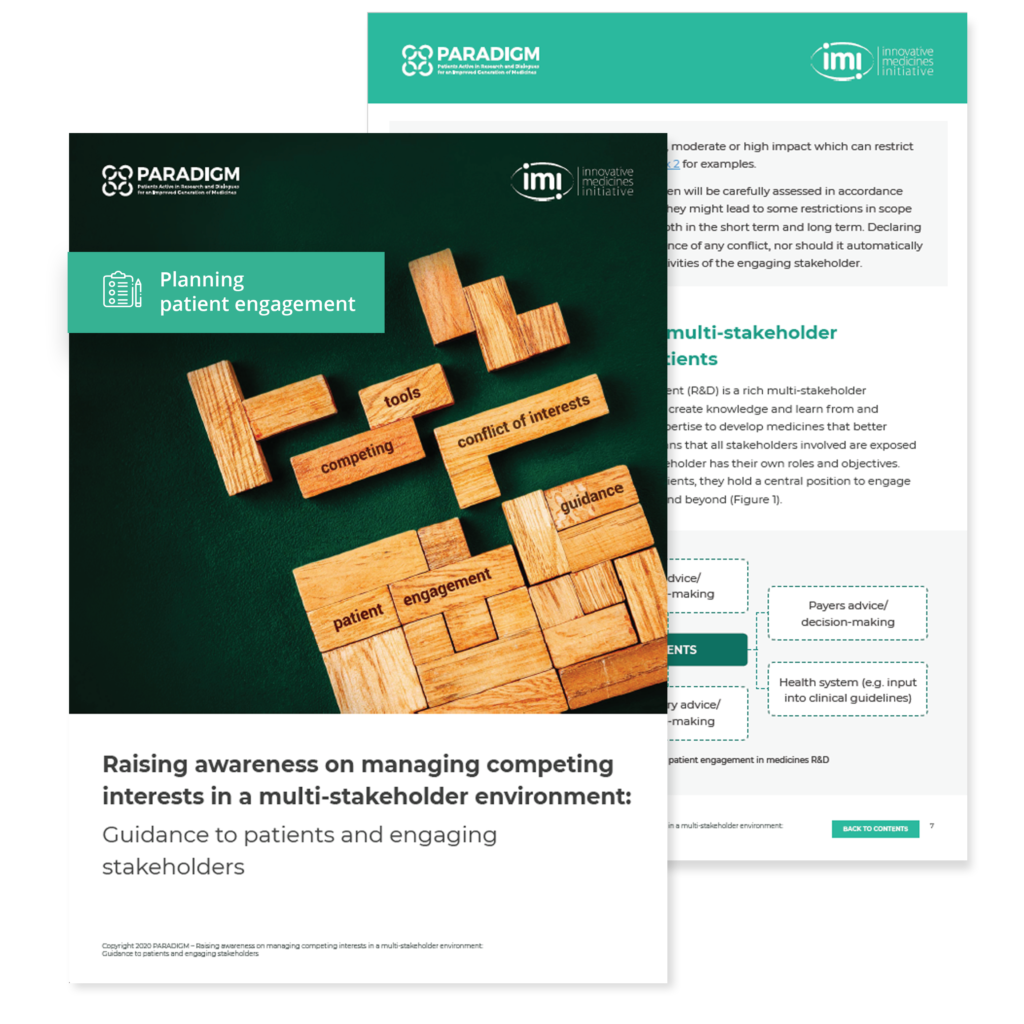
- Printable tools
- Black and white version
- Russian language version
Raising awareness on managing competing interests in a multi-stakeholder environment: Guidance to patients and engaging stakeholders
Background/Rationale for the document
Managing competing interests and conflicts of interest is of utmost importance when planning, considering and conducting patient engagement activities in medicines development.
For this reason, we developed a set of tools:
- Raising awareness on managing competing interests in a multi-stakeholder environment: Guidance to patients and engaging stakeholders
- Short guidance on managing competing interests and conflicts of interests
- Log of patient engagement activities
- Educational scenarios on competing interests and conflicts of interest
Objective of the tool
These tools aim at:
- Raising awareness among patients (in their role of experts by experience) and the engaging stakeholder organisations of the consequences that the act of engagement might have on patients during multi-stakeholder interactions
- Highlighting how each stakeholder could better prospectively manage competing interests, and
- Avoiding/minimising conflict of interest by suggesting risk mitigation strategies.
Summary of the content
The main guidance is a comprehensive document outlining the definitions and types of interest, recommendations and mitigation measures as well as the considerations when engaging vulnerable populations. Examples of engagement activities and their levels of restriction are also included.
The short guidance helps clarify basic concepts and includes stakeholder-specific considerations and recommendations on conflict of interest.
The log of patient engagement activities facilitates tracking patient’s involvement in a systematic manner in order to declare their interests when engaging with one or more stakeholders.
The educational scenarios provide illustrative examples to identify common situations where conflicts of interest might occur and what measures could be taken for their management.
Key message
Together, these tools will support patients in order to take informed decisions before the engagement and help engaging stakeholders to understand the consequences that the act of engagement might have on patients during multi-stakeholder interactions in medicines development.
Methodology
A non-systematic literature search was conducted using the MeSH terms: “Conflict of Interest” and “Patient Participation”, defined as patient involvement in the decision-making process in matters pertaining to health. When the term “Drug development” was added to the previous ones, the search rendered no results. Grey literature search was also used to identify documents and reports not accessible through the usual health/biomedicine bibliographic sources. Book references were also identified through this method.
An authoring group was defined within work package 4 (WP4) partners that was balanced in terms of stakeholder representation and expertise. Within the authoring group, a core group coordinated the writing of the deliverable with review cycles performed by a wider reviewer group. Efforts were made to include legal and compliance industry representatives, patient representatives with legal background and with personal experience on the topic of conflict of interest. Representatives from the European Medicines Agency also contributed to content development and document review.
- Guidance on what should be disclosed when filling in a required declaration of interest form before engaging with a given stakeholder. A standardized form or log to keep track of the different activities in which patients engage was suggested. This resulted in the development of the Log of patient engagement activities.
- Guidance to patients and engaging stakeholders on raising awareness on how to manage competing interests in a multi-stakeholder environment: This resulted in the development of the main guidance document and the short guidance.
- Practical examples on potential situations of competing interests and conflict of interest from the different stakeholder perspectives. This resulted in the development of the educational scenarios that were based on situational judgment tests.
To develop these tools, a multi-stakeholder authoring group with representatives from the above mentioned stakeholder groups was set up, with Task 4.2 partners acting as reviewers. Writing of the tool was led by leaders of the ‘managing competing interests sub-task’. Input from all authors was sought during dedicated editorial meetings. Draft versions were reviewed by Task 4.2 reviewers. In addition, a dedicated workshop breakout session held online in April 2020 focused on getting additional feedback. The documents underwent a second consultation with the PARADIGM consortium and the PILG and a public consultation.
Contributors
| Main authors Maria Cavaller (EURORDIS Rare Diseases Europe) Elisa Ferrer (EURORDIS Rare Diseases Europe) Virginie Hivert (EURORDIS Rare Diseases Europe) |
|
| Contributors Stuart Faulkner (Oxford University) Michaela Dinboeck (Novartis) İpek Badirgali (EURORDIS Rare Diseases Europe) Karina Huberman (EATG) Giorgio Barbareschi (EATG) Paata Sabelashvili (EATG) Mark Josef Rapa (EATG) Ana Díaz (Alzheimer Europe) Mathieu Boudes (EPF) Cristian Andriciuc (EPF) Camilla Habre (EPF) |
Valentina Strammiello (EPF) Wolf See (BAYER) Daniel O’Connor (MHRA, PILG) Daniel de Schryver (Janssen) Walter Atzori (Alexion) Nathalie Bere (EMA) Maria Mavris (EMA) Anne Claire Julienne (Servier) Stephanie Ribbe (Novartis) Julie Bonhomme (EFPIA) Sheuli Porkess (ABPI) |
| Coordination Karina Huberman (EATG) Wolf See (Bayer) Ingrid Klingmann (EFGCP) |
Editorial committee Stuart Faulkner (Oxford University) Michaela Dinboeck (Novartis) |


